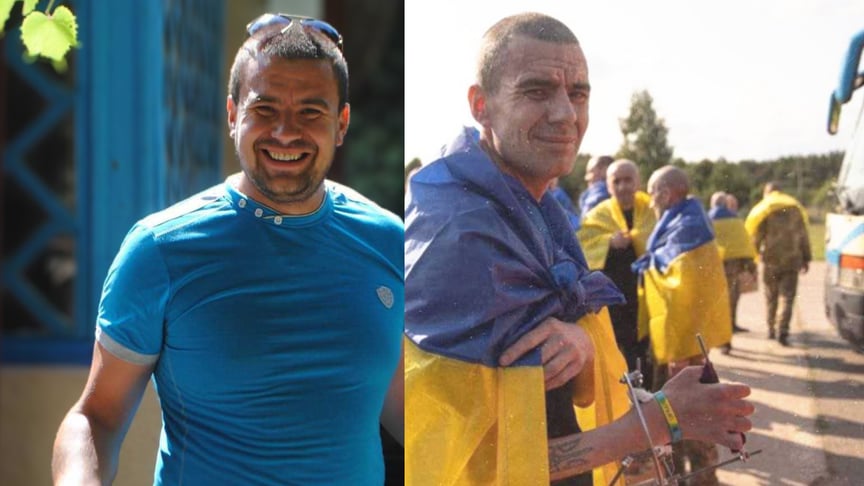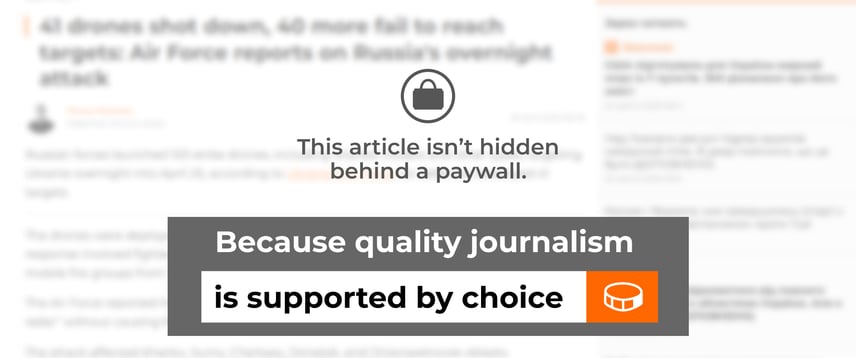Freed soldier’s journey home: From Russian captivity to Ukrainian cigarettes

“I look at the sky, the grass, the weeds, and I know I’m in Ukraine. I’m just happy.”
These words come from a former prisoner of war whose photo went viral on social media: a wounded right arm, adorned with a trident tattoo, encased in an Ilizarov apparatus. For 808 days, he lived with that metal framework. Now, Ukrainian doctors are fighting to save his arm, which no longer functions.
We speak with Volodymyr Zhylenko by phone, as face-to-face contact is restricted while he’s in a hospital.
At 44, Volodymyr holds a phone and a cigarette in his healthy hand—the cigarette he dreamed of in captivity. Or, more precisely: he craved ice cream most (in the hospital, he and a fellow soldier devoured half a kilo in one go) and specifically Ukrainian cigarettes.
“I told my buddies, ‘I’ll believe I’m in Ukraine not when they drape a flag over my shoulders, but when they hand me a pack of cigarettes that says in Ukrainian: Smoking Kills,’” he says cheerfully. Two weeks after his release, he’s gained 11 pounds (having lost over 66 in captivity) and cherishes every moment of freedom.
Mid-conversation, he pauses briefly, then blurts out, “A stork just flew by, so beautiful!”
Taken captive by Ukrainians
A history teacher, a member of the Svoboda party, and a Maidan activist from Odesa Oblast, Volodymyr Zhylenko was at the military enlistment office on the first day of the full-scale invasion. For a year, he defended Mykolaiv Oblast as an infantryman with the 110th Mechanized Brigade. In early 2023, he fought on the Avdiivka front.
On March 26, near the village of Vesele in the Avdiivka area, a battle broke out. It was a foggy day. The Russians began storming their position. Volodymyr spotted an enemy, aimed for the head, but the man survived.
“Not something to brag about, but that moment was my stroke of luck,” the soldier recalls of that hellish day. He was wounded in his right arm, a bullet shattering two bones.
It happened that one side of his arm was wounded, and the other had the trident tattoo.
“Blood was gushing, bones broken, I couldn’t hold my weapon and crawled a few meters from the main position to another trench.”
After an unsuccessful battle for the Ukrainians, the enemy—fighters from the Vostok battalion—cleared the area. They finished off the wounded, lobbing grenades at the position, but Zhylenko survived. They found him and took him captive because he could still walk.
“One of the Vostok fighters asked where I was from. Turned out, he was from Odesa Oblast, too. He filmed a video of me and the other prisoners, saying, ‘You survived, and we need an exchange pool.’ That video was posted on their channels, and that’s how my family learned I was alive,” the teacher recounts.
So, what was his stroke of luck? The fighter he wounded was the one who escorted him.
“He led me for a couple of kilometers, thrilled that he’d been shot in the head and wouldn’t have to fight anymore, that he’d get paid for his injury. He had no idea it was me who shot him. Obviously, I didn’t confess,” Volodymyr says with a laugh.
He insists he was incredibly lucky: no one wants to fall into the hands of Ukrainians from occupied territories fighting for Russia.
“They’re considered crueler than the Russians. A friend of mine lost his arms and legs because they kept him in a basement without medical care. Gangrene set in after frostbite. Chechens eventually pulled him out,” he reflects.
The trident
“Why did you do that?” the enemies kept asking about his trident tattoo. He played dumb: “It’s the symbol of Prince Volodymyr, my Orthodox patron.” — “What prince?” — “Volodymyr the Red Sun.” — “Oh, okay.”
“And it worked. Maybe their half-pagan beliefs helped save that arm—they didn’t cut it off. They even treated it. Though I wasn’t counting on it and was literally saying goodbye to my right hand,” he says.
The Ukrainian soldier was operated on immediately, and the bullet was removed on the 10th day after the injury. An Ilizarov apparatus was installed, with rods and rings that needed periodic adjustment to ensure the bones healed properly. No one did that.
“On one hand, it’s bad because my arm doesn’t work. On the other, maybe it saved me—both in the colony and the detention center, they had fewer questions for me because I was injured. They barely punished me,” the Ukrainian soldier shares.
He spent nearly 10 months in a Donetsk infirmary. He was given antibiotics, had his bandages changed several times a day, and was even administered vitamins.
Masked "healers"
As a historian, Zhylenko couldn’t resist landing historical jabs at his captors.
“For the first few weeks, I observed, stayed quiet, listened to their conversations. Then I realized they weren’t beating or torturing me. On May 9, a senior guard asked if it’s true that Ukraine doesn’t honor Victory Day. I said, ‘When was the last time you cleaned up around a war memorial?’ — ‘That’s not my job.’ — ‘Well, I did it every year with my students.’
Or he’d ask, ‘Do you know how many kids have died in Donbas?’ Claiming 300 since 2014. I’d reply, ‘What about the kids in the Mariupol Drama Theater—are they Donbas kids or Ukrainian?’ — ‘They’re brainwashed,’ he’d mumble, then go on YouTube via VPN to look it up. His arguments always fell apart, and the discussion ended. After that, he lost his appetite for propaganda talking points,” Volodymyr recounts.
One day, about six months later, masked men arrived at the hospital, took fingerprints, and called the historian for a private interrogation.
“Unpleasant things happened during that interrogation. But something good came of it, too: my shoulder, dislocated from the injury, wouldn’t go back in place. They grabbed a stool, whack—and my shoulder was fixed. You could say they were healers, not torturers,” he laughs.
After the masked men left, the soldier watched his sharp tongue. But when asked if he was a patriot, he always answered, “Yes, I love my country.”
“Wherever I was—Donetsk, Donetsk Oblast, or Russian territory—my answer was the same: ‘I love my country.’”
A prisoner’s weight depends on who serves the food
The worst food was in the Donetsk infirmary. That’s where Volodymyr lost the most weight, dropping from 209 to 154 pounds. It all depended on the woman serving the food. One, named Viktoria, tried to give the Ukrainian guys as much as possible, as Russian soldiers were treated there, too. If food was left over in one wing after lunch or dinner, she’d collect it and bring it to Volodymyr and his brothers-in-arms. Later, in the colony, the guys asked newcomers from that hospital about Viktoria. They learned she had died of a heart attack.
Another woman, her coworker and a single mother of two, took cookies, fermented milk, and baked apples from the prisoners to bring home.
After Donetsk, Volodymyr Zhylenko was sent to the Kirovska Correctional Colony in Donetsk Oblast. In four months in the medical unit, he gained so much weight that another prisoner he’d met in the hospital barely recognized him when he arrived at the colony later.
“I waddled in like a seal, and if it weren’t for the rods in my arm, he wouldn’t have known it was me,” the soldier recalls. “We were so thrilled to have food that we ate everything, not knowing what was next.
The head of the dining hall, a convicted inmate (the colony still housed some with criminal pasts), ordered the servers to ‘remember: the guys from the ‘pit’ (segregation unit) and the ‘crosses’ (medical unit) need to be fed well’. So the portions were generous, filling 650-milliliter bowls.”
Last May, he was transferred to Russia, to the city of Orsk. There, he was held in a model colony for all of Russia: a human rights ombudsman’s representative visited, gifts were handed out (which were taken back when he left), the facility had fresh renovations, cells held five people, hot water was available, and there was a weekly bath and linen change.
“But I brought scabies from there,” he laughs. In the colony, he dropped back down to 139 pounds. His arm was “treated” with bandage changes. In Orsk, they nicknamed him Terminator. He kept saying, “I’ll be back.”
The plane took off and landed six times
On June 8, Trinity Sunday, an exchange was announced. “A big day, remember it!” they said. He was given a razor to shave and returned the gifts they’d taken—socks, underwear, candies, condensed milk, and cookies.
Six times, the plane carrying the Ukrainian historian-soldier took off and landed. He saw nothing: he was blindfolded and handcuffed. He now thinks the plane was collecting prisoners across Russia.
He joked they were giving him a tour of Russia’s Golden Ring. The final landing was in Gomel, Belarus—he caught the name out of the corner of his eye. A few hours later, buses with the former Kremlin captives were in Chernihiv Oblast.
“People stood on the roadsides, waving, kids jumping. And I looked: birds, sky, weeds—so beautiful! Holy cow!” Volodymyr doesn’t hide his excitement.
“Throughout captivity, I said I didn’t remember my wife’s phone number. But when they handed me a phone, I dialed her right away: ‘Well, did you wait for me?’ Of course, I was joking—I knew she, my mom, and my daughters (I have three) were waiting. In the last month in the colony, I got three letters from them, dated last year and this year.”
I want to live, just live!
Now, he’s in a hospital in one of Ukraine’s central regions. His scabies has been treated, and top specialists are working on his arm, though their prognosis isn’t optimistic. He can’t move his fingers, only slightly rotate his wrist.
“It’s sad, but I’m alive. Maybe that’s the price? Who knows. I feared two things in the war: being captured and getting wounded in my right arm. And both happened. When I was hit, I applied a tourniquet and recited the Lord’s Prayer. I’m a Christian, by the way—my call sign is Deacon.” Volodymyr reflects on his future: “I don’t think I’ll feel suicidal or turn to drinking. What will I do? I want to live, just live. I’m an optimist by nature, I can’t sit still, and people like that bounce back faster. They have kids, and climb Hoverla.
I got so caught up talking to you, I missed lunch. But it’s fine—my family brought me all sorts of stuff. And they feed us great here. I really loved this salad with boiled beets and prunes. It’s unreal. I’m just a guy who loves to eat,” he laughs out loud once again.
- Share:

